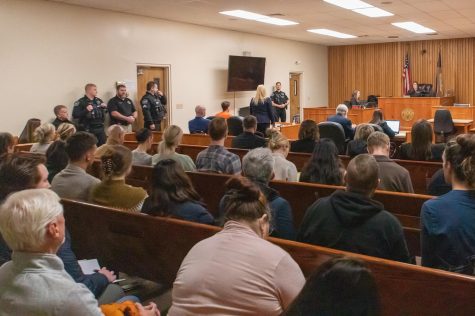Prof studies body camera footage
Researcher presence during law enforcement interaction can skew data, cameras less biased
February 12, 2018
A WSU researcher is using police body camera footage to understand how law enforcers use force and interact with civilians.
David Makin, a WSU criminal justice professor and lead researcher on the project, said over the course of 50 years of history and research into police encounters, no one has collected truly unbiased information on the events as they unfolded — only on what happens afterward. He is researching how police interact with the public, and encoding the information using data analytics, biometrics and learning machines.
“We have done systemic social observations, ride-alongs, for decades,” Makin said. “We always run into the classic adage that you inevitably influence that which you study.”
Having a researcher present to record encounters may lead to an officer behaving in a manner that is not typical and skewing the data, he said. Makin prefers using body cameras because they allow him to completely repress any researcher influence, while producing objective data.
WSU has partnered with Axon, a company from Arizona that makes items for law enforcement officers. The company’s CEO and Founder, Rick Smith, believes that this is an exciting avenue for their company’s body-worn cameras, he said in a news release.
“Our core mission is to protect life,” he wrote, “which means protecting officers and citizens alike.”
Makin and Dale Willits, another professor of criminal justice at WSU, have published some of their findings in the Journal of Research and Crime in Delinquency, but are still working on the project. Their research supports pre-existing theories about disproportionate use of force on different groups. However, they are quick to caution their findings should not be taken out of context and applied on a broad scale.
Although Makin and Willits have published their research, Makin has no intent of slowing down.
“I don’t intend to stop doing this kind of research because I believe it is extremely important for practical benefits,” Makin said, “not just for the academic benefits of testing and theories.”

















